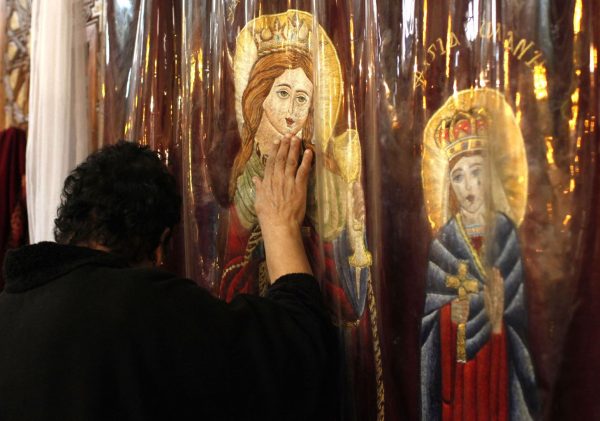“If you have faith as a grain of mustard seed, you will say to this mountain “Move hence to yonder place”, and it will move”
You probably know the story of the old Scots woman whose cottage window was overshadowed by a hillock. One day she read these words of Our Lord about moving mountains; so that night when she said her prayers, she asked that the hillock might be removed. Next morning she pulled aside the curtains, and on finding it still there, remarked: “Aye, just as I thought”.
Well she hadn’t fulfilled the conditions: when we pray, we are to have faith. But the question is “what does having faith mean?” Did OurLord mean that the most important thing to do when we pray is to work ourselves into a certain state of mind, a state of feeling confident that we shall get what we want?
An extreme example of this technique is found I suppose in some so-called “faith-healers”; they want the patient to have complete confidence that the cure will work, they want him to have complete faith in being healed.
But that is not Christian prayer – or indeed any kind of prayer: at the best it is suggestion: sometimes it may work, to a greater or less extent, but there is nothing supernatural about it, and nothing specifically Christian.
We are called to put our Faith, not in being healed, but in God; not in mountain-moving but in God; and this involves these points:
First we ought to believe that God can do what we ask. He can undoubtedly move mountains if He chooses (though generally he keeps them where they are) for He is almighty. This we believe – at least we say so in every church service. But how far we have got an imaginative grasp of this truth is another matter; and it is not essential that we should have – our prayer can still be acceptable. And secondly, even more important than believing truths about God is personal trust in Him.
But in neither case is it our business to try and work up feelings of confidence – though it is a help if God gives them to us. What God requires of us is rather that we should act in accordance with our belief; and if it sometimes feels more like acting as though we believed – well never mind; God accepts it (He knows all about our difficulties). He only requires us to do what we can, not what we can’t. The fact that you pray shows that you believe.
This brings us to the third point.
We have spoken of trusting God and this includes trusting Him to know what is best for us and for the people we pray for.
Our ideas of what would be best are often wrong. If we could be sure of getting exactly what we prayed for it would be unbearable: we might well be afraid ever to ask for anything in case it turned out to be a curse instead of a blessing (Midas).
But in fact we need have no such fear; for prayer is not a magic to get what we want; it is putting ourselves and the people we pray for into God’s hands, so that he can give what he thinks best and “what God thinks best” means what is best. There is never any question of trying to make God change His mind, or cajoling Him; but of letting him use us to make His will effective.
Suppose you are praying for a drunkard: that he should simply cease from his drunkenness might not be the best thing for him: if he did that without finding God, he might be worse off than before, and use his new-formed freedom from this craving for drink in ways moredisastrous for himself and others. There was an actual case in where a drunkard was prayed for: he developed dropsy, with the result that he could not go out and get his drink; and he was converted, and made a good death.
The prayer was answered all right; the answer, however, was not what some people would have expected – a mere cure from drunkenness – but something very much better – the salvation of his soul.
Your job as an intercessor is not to form beforehand your own idea of what God ought to do and put your Faith in that; but to put your Faith in God, and offer your prayer to Him so that He can work through it His will; for His will alone is perfect. God doesn’t want you to provide Him with information when you intercede but to offer your energy for Him to use – though both these points may need qualification: on the one hand it helps us to pray if we know something about the person or cause we are praying for; and on the other hand we are not to concentrate and try to effect something with our own personal energy, but be still and let the Heavenly Spirit pray in us – and this means that Holy Eucharist is the centre of our intercession, as of everything else.
This, then, is one reason why prayer is not answered: because the thing we asked ( for ourselves or others ) was not in fact good for us, though we thought it was. Or perhaps it was good, but God intended something better.
( But note in passing that what is in fact better may not be so immediately attractive to fallen men – often we are the child wanting to play with the pretty flames in the fire, or the sick man who dislikes his medicine ).
In the cases we have been considering, our prayer is answered; for our prayer – in so far as it was truly Christian prayer; in so far as it was really in Christ’s name – was basically that God’s will should be done: very likely we had our own ideas of what His will would be in this given instance; but we are not put out when He gives something else which we recognize ( though perhaps not at once ) to be better.
But then there are other cases where we recognize no such thing: the state of affairs seems obviously contradictory to God’s will.
Well first of all, God may not grant the prayer at once: he is much more patient than we are: it may not in fact be best for us to get the results immediately: we need to take seriously this possibility: that it may be better (for us and for the people we pray for) to wait “…it is not for us to know times and seasons…”
Of course to unbelievers all this seems to be cheating – whatever happens, we say it is all right; it is the will of God. But of courseunbelievers take this line: we trust God, and they don’t. But on the other hand it is not true that whatever happens that we take to be the will of God. It is true that however bad it is, God must be allowing it, else it could not happen. To use C. S. Lewis’ illustration, it is like the mother who wants the children to learn to keep things tidy themselves; she tells them so, and leaves them to do it – and finds the nursery in chaos: she doesn’t want the nursery to be in chaos but she has allowed it by giving them freedom.
Now this brings up the other reason why prayers are not answered – that God has given some of His creatures freedom, He has made them really free, even to oppose His will, he won’t force them. God is prepared to do anything to bring us to Himself, – except forcing our will – even prayer does not force the will of the person who is prayed for: but it does draw ( as Our Lord said to St Catherine of Sienna ) – and if it doesn’t draw at once, it waits. Nevertheless, the person prayed for is free to go on refusing to the end, if he is determined to, and the prayer will not force him. In that case your prayer returns into your own bosom. But whatever happens, it is notwasted: for nothing offered to God is wasted. In and through the prayer, God’s will is done, even if the particular person by prayed for is not converted; for prayer is love and love is eternal.
This has brought us, finally, to the question how prayer for other people works:
Well, it is not our business to know in detail; but there are some things we can say:
1.We offer our prayer to God as a channel through where he can work to help others. Intercession releases and brings to bear the power of God: in our prayer we offer ourselves to God for him to use. For example: you go into a church where the Litany (?) is beingsaid: either you can follow your own lazy day-dreams ( I mean deliberately – I am not thinking of involuntary distractions ) or you can give your energy and attention to God, offering yourself to Him for these five or ten minutes on behalf of sick persons, fatherless children and widows and the rest – and in that you provide a channel through which God can pour His blessing on them – and we need to keep on praying in order to keep the channel open [ this is the point of the parable of the Unjust Steward – not ( of course ) thatGod is unjust or unwilling to hear ].
2. Your prayer does not force the will of the people you pray for; it is more like the Archangel Michael standing in front of them to protect them from the devil so that they will be free to turn to God. The point is that God has made us depend on one another: on the natural level the sick man depends on the nurse; and if she neglects him, God lets him die. And we may depend on each other just as much on the super-natural level: if you neglect to pray for the man who needs your prayers, God may let him die – physically or spiritually. Christians are one body in Christ and His life circulates through the intercessor to the people he is praying for; and prayer is not just a matter of words, but of a whole life surrendered to God as an open road along where He can pass into other lives.
Our human schemes and endeavors, except so far as they are done in this power of prayer, are like trying to irrigate the desert with a watering can; but when we pray we offer ourselves to God as channels through which he may pour His inexhaustible supplies of grace. Prayer is the greatest power in the world, for it releases and brings to bear the almighty power of God.
10 December 1961

















